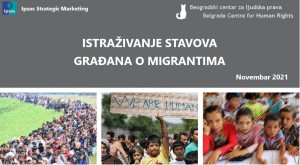The Belgrade Centre of Human Rights has the pleasure to present the results of the public opinion survey poll on refugees and migrants in the Republic of Serbia.
The key survey findings show that the vast majority of Serbia’s citizens (85%) do not know how many migrants and refugees are living in Serbia. Only 15% of the pollees said that they knew how many migrants are now living in Serbia; on average, they put their number at around 22,000.
Most of the respondents (56%) were against Serbia granting African and Middle East refugees citizenship; 25% disagreed. The respondents’ answers to questions on the refugees’ integration in terms of their employment and education, whether they would have anything against refugees becoming part of their family or living in their neighbourhoods indicate that women, university graduates, residents of urban settlements and youth are more tolerant towards refugees.
One out of two respondents said that they would befriend refugees from Africa or the Middle East. Willingness to befriend refugees was slightly higher in Vojvodina and among university graduates. Slightly over half of the respondents (54%) would not be pleased if an African or Middle East refugee married into their family. Many of the latter are male and live in rural areas. On the other hand, slightly over a third of the respondents (37%) would have no problem with that; many of them were women, youth and university graduates.
Over half (56%) of the pollees would have nothing against African and Middle East refugees settling down in their neighbourhood. Many of them were Belgraders and residents of other urban areas. On the other hand, 39% disagree with them, mostly because they fear for the safety of their neighbourhood. Headway on this issue has been noted compared with 2019, when only 42% of the respondents would have welcomed refugees in their neighbourhood.
The vast majority of respondents (78%) have nothing against children of African or Middle East refugees going to school with their children. Interestingly, this percentage was much lower in 2019, standing at 58%. It may be concluded that Serbia’s citizens have become more tolerant towards refugees, at least when it comes to education, and that they view refugee children as members of society who have the right to education.
The survey results also show that Serbia’s citizens have grown more tolerant about working side by side with refugees – the number of respondents who had nothing against refugee co-workers grew from 39% in 2019 to 51% in 2021. One out of two pollees would have nothing against working together with African and Middle East refugees and would help them feel welcome. Another third would have nothing against working with refugees, but would not spend their time with them after work. Women and Belgraders are more willing to accept refugee co-workers.
The respondents’ views on the state’s migration policies are divided. Nearly a quarter of them approve Serbia’s policy on African and Middle East refugees, while 36% hold otherwise. In 2019, one out of three respondents approved of Serbia’s migration policy. Interestingly, the number of respondents who said that they were not fully familiar with the state policy on migrants fell substantially since 2019, from 30% to 16% in 2021.
Asked whether the parties’ position on migration was one of the factors they would take into account when deciding which one to vote for, 60% of the respondents replied ‘yes’. Interestingly, most of them are pensioners. The percentage of respondents who consider this an important issue increased by nearly 10% since 2019.
The public opinion survey on refugees/migrants in Serbia was conducted in cooperation with the Ipsos Strategic Marketing agency on a representative sample of 1,000 citizens in November 2021. The questionnaire comprised 10 questions of various types. Most of the questions were Likert scale questions allowing the respondents to express how much they agree or disagree with a particular statement.
The entire 2021 survey is available in Serbian here.
The November 2019 survey is available in Serbian here.








